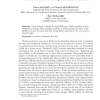2869 search results - page 55 / 574 » The Inference Problem: A Survey |
AAAI
2011
12 years 10 months ago
2011
Coarse-to-fine approaches use sequences of increasingly fine approximations to control the complexity of inference and learning. These techniques are often used in NLP and visio...
KER
2008
13 years 10 months ago
2008
Semantic technologies promise to solve many challenging problems of the present Web applications. As they achieve a feasible level of maturity, they become increasingly accepted i...
ORL
1998
13 years 9 months ago
1998
Good heuristic solutions for large Multisource Weber problems can be obtained by solving related p-median problems in which potential locations of the facilities are users location...
COLT
1999
Springer
14 years 2 months ago
1999
Springer
We present a unified framework for reasoning about worst-case regret bounds for learning algorithms. This framework is based on the theory of duality of convex functions. It brin...
CPAIOR
2008
Springer
13 years 11 months ago
2008
Springer
Theoretical models for the evaluation of quickly improving search strategies, like limited discrepancy search, are based on specific assumptions regarding the probability that a va...

